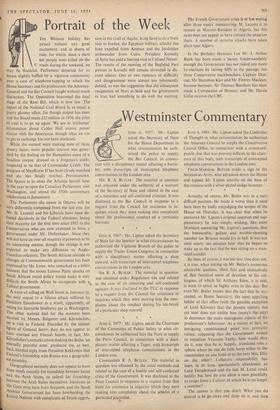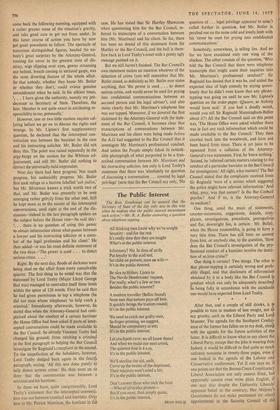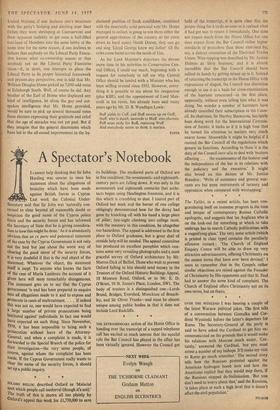Westminster Commentary JUNE 6, 1957: Mr. Lipton asked the Secretary
of State for the Home Department in what circumstances he auth- orised the police to supply the Bar Council, in connec- tion with a disciplinary matter affecting a barris- ter, with transcripts of intercepted telephone conversations in the London area. .
Mit. R. A. Bunsa : The material in question was obtained under the authority of a warrant of the Secretary of State and related to the case of a notorious and self-confessed criminal. It was disclosed to the Bar Council in response to a request from the Council for assistance in in- quiries which they were making into complaints about the professional conduct of a ,-.articular barrister.
*. * JUNE 6, 1967: Mr. Lipton asked the Secretary of State for the Interior in what circumstances he authorised the Vigilante Branch of the police to supply the Trades Union Congress, in connection with a disciplinary matter affecting a shop steward, with transcripts of intercepted telephone conversations in the London area.
Silt R. A. BUTLER: The material in question was obtained undur Regulation 64a and related to the case of an annoying and self-confessed agitator. It >vas disclosed to the TUC in response to a request from the Council for assistance in inquiries which they were making into the com- plaints about the conduct during his tea-break of a particular shop steward.
JUNE 6, 1977: Mr. Lipton asked the Chairman of the Committee of Public Safety in what cir- cumstances he authorised Izzy the Nark to supply the Press Council, in connection with a disci- plinary matter affecting a Taper, with transcripts of intercepted telephone conversations in the London area.
COMMANDER R. A. BUTLER: The material in question was obtained by the usual methods and related to the case of a hostile and self-confessed critic of the Government. It was disclosed to the Press Council in response to a request from that body for assistance in inquiries which they were making into complaints about the articles of a particular journalist. JUNE 6, 1984: Mr. Lipton asked the Controller of Thought in what circumstances he authorised the Attorney-General to supply the Conservative Central Office, in connection with a crossword- puzzle clue that was proving difficult to the chair- man of that body, with transcripts of intercepted telephone conversations in the London area.
FIELD-MARSHAL BUTLER made a sign to the Serjeant-at-Arms, who advanced down the House and tapped Mr. Lipton smartly on the base of the cranium with a silver-plated sledge-hammer. * * Actually, of course, Mr. Butler was in a very difficult position. He made it worse than it need have been by badly misjudging the temper of the House on Thursday. It was clear that when he answered Mr. Lipton's original question and sup- plementary he was simply wishing, like most Ministers answering Mr. Lipton's questions, that the honourable, gallant, and trouble-shooting member for Brixton would fry in hell. It was not until nearly ten minutes later that he began to wake up to the fact that he was sitting on a man- sized scandal.
By then, of course, it was too late. One does not, it is true, when totting up Mr. Butler's numerous admirable qualities, think first and instinctively of that fanatical sense of devotion to his col- leagues, of which Sir Anthony Eden, it is said, is wont to speak so highly even to this day. But even Mr. Butler knows that the fact that he suc- ceeded, as Home Secretary, the most appalling holder of that office (with the possible exception of Lord Kilmuir) that the present century has yet seen does not entitle him (more's the pity) fo denounce the more outrageous aspects of his predecessor's behaviour. As a matter of fact, an intriguing ' constitutional point was promptly raised; Su-pposing that the Government wished to repudiate Viscount Tenby, how would they do it, now that he is, happily, translated into a sphere where he can do little harm either to the constitution on one hand or to the next Mrs. Ellis on the other? Collective responsibility has been, in its time, spectacularly abandoned, as Lord Templewood and the late M. Laval could testify; but how do you. allow a man gracefully to resign from a Cabinet of which he is no longer a member?
The answer is that you don't. What you do instead is to go away and sleep on it, and then come back the following morning, equipped with a rather greater sense of the situation's gravity, and take good care to get out from under. In this latter course of action you have by now got good precedents to follow. The spectacle of numerous distinguished figures, headed (to no- body's great surprise) by the Attorney-General, running for cover in the greatest state of dis- array, wigs slipping over eyes, gowns streaming out behind, breath coming in tortured gasps, was the most diverting feature of the whole affair. So that nobody, whether they know Mr. Butler Or whether they don't, could evince genuine astonishment when he said, in his silkiest tones, 4. • . I have given the authority, namely my pre- decessor as Secretary of State. Therefore, the hon. Member is not quite exact in attributing re- sponsibility to me, personally.'
However, one or two little matters require col- lating before we go on to discuss the rights and wrongs. In Mr. Lipton's first supplementary question, he declared that the intercepted con- versation was between the barrister in the case and his instructing solicitor. Mr. Butler did not deny this. The point was raised repeatedly in the argy-bargy on the motion for the Whitsun ad- journment, and still Mr. Butler did nothing to Correct the universally-held impression.
Next day there had been progress. Not much progress, but undeniably progress. Mr. Butler first took refuge in a burrow labelled 'sub judice,' but Mr. Silverman knows a trick worth two of that, and Mr. Butler was presently to be seen emerging rather griroly from the other end. Still he kept mum as to the nature of the intercepted conversations, until right at the end of the dis- cussion—indeed in the last paragraph spoken on the subject before the House rose—he said this : 4. . . there is no question of using this power to obtain information about what passes between a lawyer and his instructing solicitor or a mem- ber of the legal profession and his client.' He then added—it was his most definite statement of the two days—`The power is used . . . to detect serious crime. . .
Right. By the next day, floods of darkness were being shed on the affair from every conceivable quarter. The first thing to be noted was that the statement by Lord Tenby (Major Lloyd George that was) managed to contradict itself three times within the space of 128 words. First he said that he had given permission to tap a telephone (he did not state whose telephone) `to help catch a criminal.' Immediately afterwards, however, he stated that when the Attorney-General had com- plained about the conduct of a certain barrister the Home Office had been asked if parts of inter- cepted conversations could be made available to the Bar Council. So already Viscount Tenby had changed his ground; from catching a criminal in the first paragraph to helping the Bar Council investigate Sir Reginald's complaint in the second.
To the stupefaction of the beholders, however, Lord Tenby dodged back again in the fourth paragraph, saying, 'All this was done purely to help detect serious crime.' He then went on to deny that the conversation was between a criminal and his barrister.
So there we have, quite unequivocably, Lord Tenby's statement that the intercepted conversa- tion was not between criminal and barrister. Over now to Mr. Patrick Marrinan, the barrister in thO case. He has stated that Sir Hartley Shawcross when questioning him for the Bar Council, re- ferred to transcripts of a conversation between him (Mr. Marrinan) and his client. So far, there has been no denial of this statement from Sir Hartley or the Bar Council, and the ball is there- fore back in Lord Tenby's court with a pretty ugly message painted on it.
But we still haven't finished. The Bar Council's own statement makes no mention whatever of the detection of crime (you will remember that Mr. Butler stated, as definitely as Mr. Butler ever states anything, that 'the power is used . . . to detect serious crime, and would never be used for prying into confidential communications between an accused person and his legal adviser'), and also states clearly that Mr. Marrinan's telephone line was not tapped. Moreover, if we dovetail the first statement by the Attorney-General with the state- ment of the Bar Council, it becomes clear that transcriptions of conversations between Mr. Marrinan and his client were being made before the A-G had suggested to the Bar Council that it investigate Mr. Marrinan's professional conduct. And unless the People simply faked its remark- able photograph of what purported to be a tran- scribed conversation between Mr. Marrinan and his instructing solicitor, not only is Lord Tenby's statement that there was 'absolutely no question of discussing a conversation . . . covered by legal privilege' (note that the Bar Council say only, 'No question of . . . legal privilege appeared to arise') called further in question, but Mr. Butler is perched out on the same cold and lonely limb with his 'never be used for prying into confidential communications.'
Somebody, somewhere, is telling lies. And so far we have examined only one wing of the chicken. The other consists of the question, 'Who told the Bar Council that there were telephone transcripts that might assist their inquiries into Mr. Marrinan's professional conduct?' Sir Reginald has denied that it was he, and added the expected slice of high comedy by saying queru- lously that he didn't even know that any phone- tapping was going on until he saw Mr. Lipton's question on the order-paper. (Quaere, as Aubrey would have said : if you had a deadly secret, would you tell Sir Reginald Manningham-Buller about it?) All the Bar Council said on this point was, 'The Home Office were asked whether there was in fact any such information which could be made available to the Bar Council.' They then crawled back into the woodwork, and have not been heard from since. There is yet juice to be squeezed from a collation of the Attorney- General's two statements. First, he 'knew nothing.'
Second, he 'referred certain matters relating to the conduct of a particular barrister to the Bar Council for investigation.' All right, what matters? The Bal. Council stated that the complaints received from Sir Reginald 'were of a nature which suggested the police might have relevant information.' And what, pray, was that nature? Is the Bar Council psychic? And if so, is the Attorney-General its medium?
One thing, amid the maze of statements, counter-statements, suggestions, denials, com- plaints, investigations, precedents, prerogatives and flat, downright lies, is certain : Mr. Butler, when the House reassembles, is going to have a very thin time. There has still been no answei from him, or anybody else, to the question, 'How does the Bar Council's investigation of the pro- fessional conduct of a barrister involve the detee- tion of se...ions crime?'
One thing is certain? Two things. The other is that phone-tapping is certainly wrong and prob- ably illegal, and that disclosure of information obtained by it to a body like the Bar Council 4. 9onduct which can only be adequately describea as being fully in accordance with the standarda one would have expected from Lord Tenby.
* * * After that, and a couple of stiff drinks, it is possible to turn to matters of less weight, not .to say gravity, such as the Liberal Party and Lor51 Munster. The agenda for the Southport Confet- ence of the former has fallen on to my desk, alon with the agenda for the future activities of the latter. It is difficult to know what to say about the Liberal Party, except that the joke is wearing thin. Indeed, it would be difficult to find quite so much unfunny nonsense in twenty-three pages, even if one looked in the agenda of the Labour and Conservative conferences. Yet if one says so, if one points out that the Barons Court Constituency Liberal Association not only cannot think, but apparently cannot even write plain English, if one says that despite the University Liberals' apparent belief to the contrary, Her Majesty'S Government do not make permanent (or other) appointments to the Security Council of the • 1 United Nations, if one declares one's weariness with the party's hedging and ditching over Suez (when they went shrimping at Caernarvon) and their apparent inability to get even a half-filled taxi-load of Members into the same lobby at the seine time for the same reason, if one declines to believe that anybody on the Liberal Party Execu- tive knows what co-ownership means or that anybody not on the Liberal Party Executive cares—if, in short, one attempts to place the Liberal Party in its proper historical framework and present-day perspective, one is told that Mr. William Douglas Home picked up 7,000-odd votes at Edinburgh South. Well, of course he did. Any brother of the Earl of Home who displayed any kind of intelligence, let alone the gay and out- spoken intelligence that Mr. Home provided, Would be sure to pick up several thousand votes from electors expressing their gratitude and relief that the age of miracles was not yet past. But if they imagine that the general discontents which have led to the all-round improvement in the by- electoral position of freak candidates, combined with the deservedly solid personal vote Mr. Home managed to collect, is going to win them either the general approbation of the country or (to come down to hard cases) North Dorset, they can go and sing 'Lloyd George knew my father' till the cows come home across the sands of Dee.
As for Lord Munster's departure (to devote more time to his activities in Conservative Cen- tral Office), I could say much, beginning with a request for somebody to tell me why Central Office should be landed with a Minister who has been stiffing around since 1952. However, every- thing it is possible to say about his resignation (plus KBE), and the appointment of Lord Man- croft in his room, has already been said many years ago by Mr. D. B. Wyndham Lewis:
Buff yields to Cuff, and Huff moves up on Guff; Nuff, who is dumb, succeeds to Muff, who chatters. Puff steps aside for Ruff, replacing Wuff And everybody seems to think it matters.
TAPER




































 Previous page
Previous page